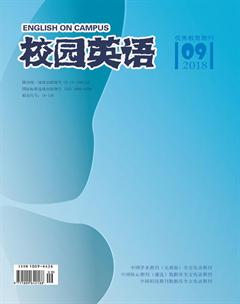The Translation of English Lettered Words in Chinese
【Abstract】Language is the product of social development, which inevitably reflects social values. More frequent cultural exchanges between China and foreign countries have contributed to the emergence of English lettered words in the Chinese language, so it is of great necessity for us to understand the linguistic phenomenon. This essay mainly focuses on the translation of English lettered words in Chinese. English lettered words can be translated into Chinese in various ways, including literal translation, free translation, literal translation plus free translation and transliteration plus free translation.
【Key words】 English lettered words; translation; language
【作者简介】王鑫彤,扬州大学外国语学院。
Have you ever heard of English lettered words? With the rapid development of Chinas economy and culture and frequent exchanges with foreign countries in the past few decades, the influx of information into China has been growing. As its name implies, English lettered words in Chinese are made up of English letters or words. These lettered words are a new type of words different from traditional Chinese characters. Therefore, it is of great importance to explore the translation of English lettered words.
TRANSLATION OF ENGLISH LETTERED WORDS
The translations of lettered words can, in a sense, represent the commonality and individuality of English and Chinese peoples. English lettered words can be translated into Chinese in various ways, including literal translation, free translation, literal translation plus free translation, and transliteration plus free translation(Xia).
LITERAL TRANSLATION. Literal translation is word by word translation. With the high refinement of social division of labor, in industries concerning different social fields have appeared many acronyms and initialisms. The translation of those abbreviations always corresponds with their names. For instance, OPEC is translated into “石油输出国家组织”, as the full name of OPEC is Organization of Petroleum Exporting Countries. Likewise, IOC (International Olympic Committee) is translated into “国际奥林匹克委员会”, and SOHO (Small Office Home Office) into “在家办公”. The translation of such lettered words is often literal translation.
FREE TRANSLATION. As is known to all, free translation is different from literal translation. While literal translation emphasizes the literal meaning of words, free translation is an alternative approach generally used to convey the meaning of the original without trying to copy its sentence patterns(Zhang), as when we translate laser into “激光”. The full name of laser is light amplification by stimulated emission of radiation. When we seek to translate it literally, we may find it hard to express in Chinese. If we translate it literally into “輻射受激发射引起的光放大”, it will lead to confusion among us all. So the best choice is to translate it freely. Similarly, SARS, which is another typical word, needs to be translated freely. Now we have accepted the idea that SARS should be translated into “非典型肺炎”, but from its full name Severe Acute Respiratory Syndromes, we can hardly know what it stands for.
LITERAL TRANSLATION PLUS FREE TRANSLATION. As English and Chinese belong to different language families and have some cultural discrepancies, we should not only express their cultural connotations, but also add necessary illustrations when translating some English lettered words. For instance, when we translate G-7 into “西方主要七个工业大国” and explain that the leaders of those seven countries hold regular summits, this is literal translation plus free translation. The reason why we translate it like this is that only in this way can we fully capture the meaning of G-7 and know its nature. Likewise, “3k黨” is translated into “白色联盟和无形帝国” together with the explanation of Ku, Klux, Klan.
TRANSLITERATION PLUS FREE TRANSLATION. Another crucial way of translating English lettered words is transliteration plus free translation. For instance, when AIDS is translated into “艾滋病”, “艾滋” is transliteration and “病” is a noun added in order to indicate the semantic category of the original word. If we translate AIDS into “获得性免疫缺乏综合症” in accordance with its full name Acquired Immune Deficiency Syndrome, it will be hard to understand and laborious to remember. In this case, transliteration plus free translation is a much better choice.
References:
[1]Bloomfield,Leonard.Language.New York:Henry Holt&Company;, 1993,Web.

